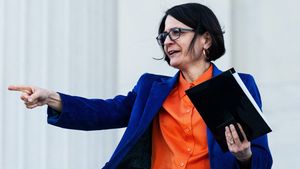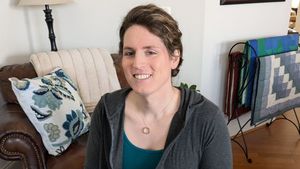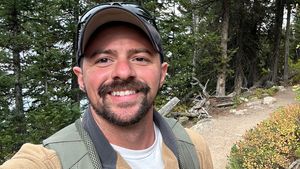In times like this, we can all use more hope.
A national organizer, author, public speaker, and communications expert, Hope Giselle-Godsey is known to many for her content, telling it like it is when it comes to the intersection of transness and Blackness. Hope speaks truth to power passionately about protecting marginalized voices and bodies in every piece. Her voice rings proudly, beckoning viewers now more than ever at a time when marginalized groups are increasingly met with hostility.
Hope is, quite simply, that girl.
I reconnected with her in early February. I was still shivering in the frigid temperatures of Upstate New York while she was enjoying the warm glow of Mexico. For Hope, sunny Mexico isn't just a leisurely getaway but a safe space where she recalibrates her sense of security and mental well-being.
"Honestly, I don't do a good job at balance," she admits, referencing the challenge of separating everyday life from activism. It's not out of choice, however: activism is inherently tied to her identity: "My life is activism because I am a Black trans woman. I'm a Black person in America. I'm a woman…whether you put those intersections together in one word or if you separate them into their own subcategories, all of those things are tough and difficult."
Because her very presence of living in her truth is an act of defiance in a world that often marginalizes Black trans women, there is little respite from the responsibility of speaking out. "It's not like I'm just calling in or it's not like I'm saying the hard thing about just one of those things," she says. "I'm saying the hard things as it pertains to being a woman, as it pertains to being a trans person, as it pertains to being a Black person." Even when she's "off the clock," these intersections remain part of her daily experiences.
When asked about what keeps her going, particularly in this new age of Trump and increasing transphobia, Hope's response cuts to the core of her unwavering drive. "If people like me stop doing this," she posited. "Then what happens to us? If we don't keep fighting for each other, or if we don't keep fighting for our rights, who else will?"
She credits historical figures like Marsha P. Johnson, Sylvia Rivera, and other unsung trans trailblazers. She imagines the cost if these figures had listened to those who dismissed them as "extra" or "too much," if they had stopped fighting because the path was deemed too difficult. "Suppose Marsha actually let some of those gay men convince her that she was doing too much," Hope muses. "Suppose Sylvia gave up the day they booed her off at a movement that she and Marsha created."
"We all have a job," she insists. "There's some part of this history that each of us has to play."
Hope's decision to relocate to Mexico was not a random whim. She mentions it was carefully planned over the years. "A lot of people think it was [a] spur of the moment," she explains, "But I'd been following the politics." She mentions spending considerable time tuning into conservative outlets, and the rhetoric and numbers presented affirmed her decision.
Her family's entrepreneurial spirit runs strong: she and her family had set down roots by investing in a spa and, eventually, a club south of the border dedicated to Black tourists, expats, and the broader LGBTQ+ community. The business investment was equally a strategy for Hope's peace of mind. The unrelenting stress of American politics gave her constant anxiety and depression, conditions she felt she had no choice but to work through. "Moving to Mexico put that into perspective, and gave me a sound reminder that I was really working myself to the bone."
Though she doesn't worry about her safety like in the United States, Hope acknowledges that she's speaking from her vantage point. She's an American who passes as cisgender in many spaces or is simply treated better because she is not a local Mexican trans woman. "I can say that I've only been treated with the utmost respect," Giselle-Godsey says. She does recount one incident involving trans performers at a former location being barred from using a shared restroom by a security guard, a confrontation revealing that transphobia can manifest anywhere.
Nevertheless, Hope is wary of American expats replicating old ways in their host countries. She highlights how many seek comfort in "Black expat clubs" or strictly American community pockets. "I think that when we lean too heavily into finding a sense of 'normal' community, we also lean really heavily in going back to our old ways," she explains. "And I don't want to do that."
Despite her busy schedule and the complexities of transnational life, Giselle-Godfrey deliberately carves out room for joy. "I'm happy, and we're navigating spaces where we both have community," she muses. In addition to her husband, from whom she receives the deep support and love gained through daily chats, Hope enjoys spending time with her mother and savoring shared bonding moments.
For Hope, this is not a break from activism but a crucial part of sustaining it.
Hope's calendar this year is packed with major milestones. She teases an upcoming recognition award, calling it a "pretty big deal." She is also scheduled for keynote engagements in the U.S. Meanwhile, in Mexico, her business venture, the Backdoor Cancun, attracts high-profile performers. Later this Spring, RuPaul's Drag Racewinner and iconic burlesque performer Violet Chachki will headline a show.
In addition to participating in the human rights conference during World Pride, Hope was cast in BLKNWS: Terms & Conditions, directed by Kahlil Joseph, whose previous collaborations include Kendrick Lamar and Beyoncé. "I'm always a phone call or email away from something major," she says with excitement and practiced readiness.
But the immense joy in her work is still met with occasional heartbreaks. She recalls a call she received not long after the U.S. election results from an elder, who told Hope plans to stop taking her HIV medication as she felt there wasn't a point of living in a hostile country.
"That was the call that broke me," she says, inflections of pain in her voice. "Hearing an elder who made it through the AIDS epidemic, who was around during the 'Club Kids' era, tell me know, because of this man [Trump], it doesn't make sense for her to keep going."
But don't give up, Hope says resolutely.
"We all have a role to play in this new revolution that is being televised," she reflects, a statement needed now more than ever on today's Trans Day of Visibility. "Take up the space you need to take up and tell the stories you need to tell. Letting them rewrite our history yet again in our faces is something that we cannot afford to do."
It's a clarion call to sustain personal well-being while engaging in collective action. Perseverance isn't an option; it's an obligation to those who came before, those who stand alongside us, and those who will come after.
Hope Giselle-Godsey's story underscores the interplay between personal identities and broader activism. She acknowledges that she hasn't mastered the art of stepping away from the front lines of advocacy, but perhaps stepping away from specific pressures to be the vigilant one is its own form of self-preservation.
"I don't get to stop because I've joined this brigade," she says plainly. "And until it becomes a space that's endangering to me or my husband or my family, I'm going to ride this thing 'til the wheels fall off." It is an assertion of devotion to the cause and an admission of what it costs to be in the good fight.
Hope's story exemplifies the ongoing trans fight for equity, safety, and equality as both a public confrontation with oppressive systems and a profoundly personal endeavor to live and love as fully as possible.
"Take up the space that you need to take up," underscoring that nobody—whether trans, cis, Black, Brown, or otherwise—should have to shrink themselves to make others comfortable.


























































































